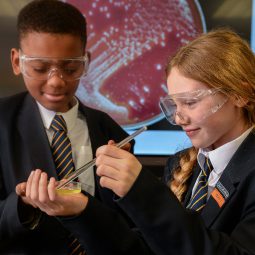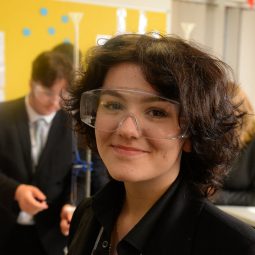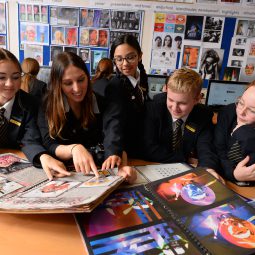Safeguarding
What is safeguarding and why is it so important?
- Protecting children from maltreatment
- Preventing impairment of children’s mental and physical health or development
- Making sure children grow up in circumstances consistent with the provision of safe and effective care
- Taking action to enable all children to have the best outcomes
Designated Safeguarding Leads

Designated Safeguarding Lead

KS3 Deputy Designated Safeguarding Lead

KS3 Deputy Designated Safeguarding Lead

KS4 Deputy Designated Safeguarding Lead

KS4 Deputy Designated Safeguarding Lead

KS5 Deputy Designated Safeguarding Lead

Safeguarding Officer

Safeguarding Officer
During school hours/term time, please contact our Safeguarding and Family Liaison Officer, Miss Ahmed or Mrs Ryan with questions or concerns. For urgent queries outside of school hours or term time, please contact the Oldham Social Care team on 0161 770 7777 or the police on 101 or 999 where there is a risk to life.
Types of Abuse and things to look out for
Neglect
Neglect the most common type of abuse and is the persistent failure (of a parent or carer) to meet a child’s basic physical and/or psychological needs, likely to seriously impair their health or development, including: failing to provide adequate food, clothing and shelter; failing to protect a child from physical harm or danger; failing to protect a child from emotional harm; failing to make sure a child has proper supervision; failing to get medical care or treatment for a child; failing to meet or respond to a child’s basic emotional needs.
Things to look out for
- Severe and persistent illnesses and infections
- Consistently inappropriate clothing or shoes
- Persistently smelly or dirty
- Signs of malnutrition
- Numerous accidents
- Poor medical and dental care
- Being hungry, stealing or hiding food
- Missing school
Physical
This means causing physical harm to a child, including: hitting; shaking or throwing; burning or scalding; poisoning; drowning or suffocating; fabricating the symptoms of, or deliberately inducing, illness.
Things to look out for
- Bruises, cuts, scratches, scars
- Fractures
- Bite marks
- Burns or scalds
- Suspicious illnesses
- Vomiting, drowsiness or seizures
- Breathing problems
Sexual
Sexual abuse is forcing or enticing a child to take part in sexual activities, including: physical contact, for example kissing, touching or rape; non-contact abuse, for example involving a child in looking at or producing sexual images; ‘upskirting’ (taking a photo under someone’s clothes without them knowing, to humiliate, distress or alarm them, or for sexual gratification); encouraging sexually inappropriate behaviour; grooming in preparation for child abuse…
Things to look out for
- Difficulty sitting
- Marks and bruises
- Poor personal hygiene
- Needing the toilet a lot
- Pregnancy
- Fear or avoidance of a particular person
- Sexually inappropriate behaviour
- Dropping hints or mentioning ‘secrets’
Emotional
Emotional abuse is persistent emotional maltreatment, severely affecting a child’s emotional development, including: making a child feel worthless, unloved or inadequate; silencing or ‘making fun’ of what a child says; placing extreme limits on what a child can do; imposing inappropriate age or developmental expectations; exploiting or corrupting; serious bullying (including cyber-bullying); exposing a child to ill-treatment
Things to look out for
- Behaviour, language or knowledge you wouldn’t expect for their age
- Struggling to control their emotions
- Seeming isolated from their parents or carers
- Negative interactions with parents or carers
- Lacking social skills or friends
- Low self-esteem or self-confidence
- Trying to make people dislike them
- Not caring how they act or what happens to them
- Issues with language development
Child on Child abuse: children can abuse other children too online or in the real world
- Bullying includes cyberbullying and prejudice-based and discriminatory bullying – for example, bullying because of a child’s gender identity or sexuality
- Abuse in intimate personal relationships - like domestic abuse, this can be physical, emotional, sexual or financial
- Physical abuse could be, for example, hitting, kicking, shaking, biting, hair pulling
- Sexual violence could be rape, assault by penetration, sexual assault
- Sexual harassment includes sexual comments and jokes and online sexual harassment
- Causing someone to engage in sexual activity without consent could mean things like forcing someone to strip, touch themselves sexually, or to engage in sexual activity with a third party
- • Sharing nude and semi-nude images or videos is also known as sexting or youth-produced sexual imagery
- Upskirting is where someone takes a photo under another person’s clothes without their permission, for sexual gratification, or to cause the victim humiliation, distress or alarm
- Initiation or hazing-type violence and rituals could include activities involving harassment, abuse or humiliation used as a way of initiating someone into a group
- Online peer-on-peer abuse may include:
- Abusive, threatening, harassing or misogynistic messages on social media or when gaming
- Sharing nude or semi-nude images and/or videos, especially around chat groups
- Sharing of abusive images and pornography, to those who don't want to receive such content
For further information and useful links please see below
Safeguarding On A Page for Parents and Carers
|
|
Safeguarding On A Page for Parents and Carers
|
Safeguarding On A Page for All Pupils
|
|
Safeguarding On A Page for All Pupils
|
Information, Guidance and Support around FGM
|
|
FGM Information Leaflet
|
E-Safety - The Blue Coat School







The Blue Coat School is proud to be part of the Cranmer Education Trust
Cranmer Education Trust is a company limited by guarantee and an exempt charity registered in England. Company registration number: 07687709. Registered Office: Cranmer Education Trust, c/o Blue Coat School, Egerton Street, Oldham OL1 3SQ. The website address is www.cranmereducationtrust.com and the phone number 0161 785 5082.









